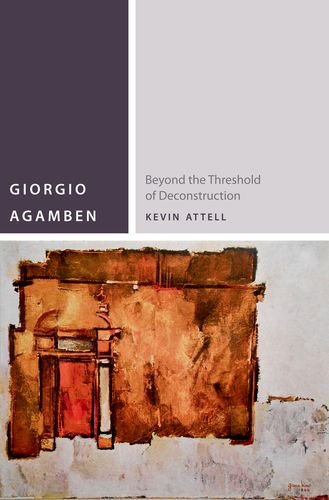Product desciption
Giorgio Agamben Beyond The Threshold Of Deconstruction Kevin Attell by Kevin Attell 9780823262052, 0823262057 instant download after payment.
Agamben's thought has been viewed as descending primarily from the work of Heidegger, Benjamin, and, more recently, Foucault. This book complicates and expands that constellation by showing how throughout his career Agamben has consistently and closely engaged (critically, sympathetically, polemically, and often implicitly) the work of Derrida as his chief contemporary interlocutor.
The book begins by examining the development of Agamben's key concepts infancy, Voice, potentiality from the 1960s to approximately 1990 and shows how these concepts consistently draw on and respond to specific texts and concepts of Derrida. The second part examines the political turn in Agamben's and Derrida's thinking from about 1990 onward, beginning with their investigations of sovereignty and violence and moving through their parallel treatments of juridical power, the relation between humans and animals, and finally messianism and the politics to come.
REVIEWS:
"In this impressive book, Kevin Attell changes our understanding of Giorgio Agamben. From now on we will have to see Agamben's work, from the very beginning, as in dialogue with Derrida. As a result an important thinker becomes still more significant to the shape of contemporary European theory."--Simon During, University of Queensland
"Giorgio Agamben: Beyond the Threshold of Deconstruction is an enormously ambitious book covering the breadth of Giorgio Agamben's writings, from his earliest work on potentiality and discourse up through his later political and theological writings. Attell's interpretations, informed by vast philosophical erudition, presenting independent interpretations of all the texts that he treats, are paradigms for work on theory. This is one of the highest caliber works of theory or continental philosophy to appear in a long time."--Joshua Kates, Indiana University
"This remarkably rigorous, lucid, and open-minded study details the important differences between Agamben and Derrida, something many would regard as minor variants in a similarly deconstructive model, but which Derrida's late seminars on The Beast and the Sovereign affirm to be profound. Attell meticulously traces the trajectories of Derrida's and Agamben's careers, demonstrating in an elegant and textually based fashion the incisive nature of Agamben's engagement with Derrida, how so many of Agamben's major themes--potentiality, sovereignty, ban, messianic time, play and profanation, and the animal--could be considered as critical, indeed polemical, responses to Derrida's philosophical project. The strong distinction between Agamben's and Derrida's (and Benjamin's and Schmitt's) notions of messianic time is particularly dazzling."--Eleanor Kaufman, University of California, Los Angeles


